Hello, mostly people. After the truncated intro last time I'm here to kick off this series proper, with this first of... some number of blogs about Troika's Temple of Elemental Evil. Expect a blog on the same subject from lunar luminary VGK when he's done talking about farting royals and anime boobs. We feudin', y'all.
Since I don't want to leave too many spoilers around here, I'll just be discussing my first impressions with the game after playing it enough to beat the first dungeon. What I like, what works well, what doesn't, what makes me want to hurl myself off a cliff. The usual. Also comics.
The Combat
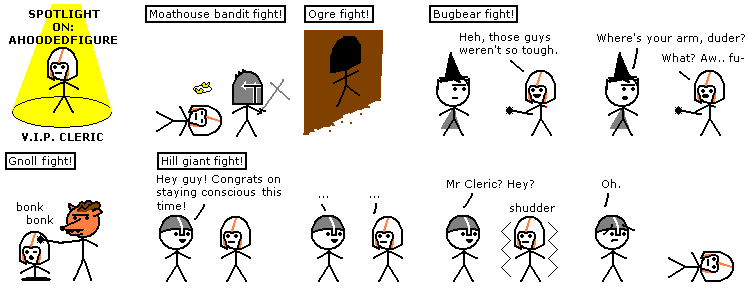
With the initiative, I'm now going to take an attack of opportunity and grapple check the in-depth combat system of 5 foot steps and trip attacks. The combat is by far the best part of this game, as you have something akin to the turn-based combat of strategy RPGs like FFT, X-COM or Phantom Brave (which is also fond of circles and radii over grids) only way crazier and D&Dier. There's so much to keep track of; whether it's your magic users' collective libraries, tripping, going prone, holding actions for an enemy's approach, or for when they try to withdraw to force them to stay put, or even for when they're trying to cast a spell so you can interrupt it. Archers need to be aware of distance and the penalties of firing into melee. Larger opponents need a full array of debuffs to knock them on their asses because they will straight up murder you if they get close. There's also the enemy's reach to consider and taking measured five-foot-steps backwards to avoid attacks of opportunity so you can get some healing done or simply stay out of harm once the hit points get critical.
It's a little daunting at first, but having so many options gives you unparalleled command of your team. Even the toughest fights will have a winning strategy that you just have to hunt around in the radial menus for, or simply be extremely lucky with dice rolls to pull off. I've played each major fight so far a couple of times at least, just because I know I can do better with what is coming - having that foresight might be a cheap way to win, but like Dark Souls (another game I imagine I'll be painfully struggling through before too long) that prescience is not only useful but vital. Ultimately, you have a process that's slow going, but rewarding. If a battle ends and only the Cleric has been knocked unconscious, I consider that a win.
The Magic
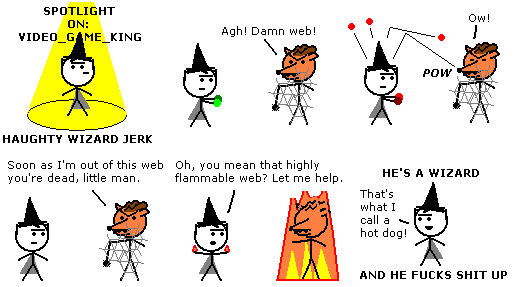
The magic-users are a large part of what makes battles interesting, sure, but like in other D&D games that consider plot, diplomacy and intrigue to be as fascinating as hitting ugly things over the head, magic has its uses outside of combat also. I only have the one magic user, as seen above, but even so I feel occasionally overwhelmed with the choices I can make with the guy. Same as with the Cleric, as while I'm tempted to just stick with healing spells there are quite a few powerful buffs in the 3rd Edition clerical handbook. At level 3 there's one for each of the six main stats, all of which have their applications: Whether your thief needs to pick a tough lock, the fighters need some more oomph to take down enemies quicker or the party spokesman needs to convince a guy to give up his magic sword or throw in more cash as a quest reward.
It isn't unfair to say that magic is overpowered in the D&D world. I mean, at higher levels, magic-users become vastly more powerful than any other class, which more than offsets their status as the unfortunate 3 HP wonders they start out as. Magic is all about resourcefulness in the end, though, and the wizard is only as powerful as the player is discerning and ingenious. You can pull off all kinds of coups against stronger opponents with the right spells at the right time, even taking down enemies as fearsome (to low-level parties) as hill giants with a tier 1 Grease spell, allowing all the fighters to just pummel the poor thing with attacks of opportunity as it tries to stand up. You could make a similar case about rogues too, with their array of skills, but as they tend to be dictated by arbitrary dice rolls (needed for staying silent, spotting traps, scoring sneak attacks, etc.) I've always considered the rogue to be more of the gambler's class.
Though I will say that it's completely crazy that the game forces you to lose 100GP whenever you identify something, whether you do so through the vendors or casting the spell yourself. No bardic knowledge to fall back on here.
The Skills
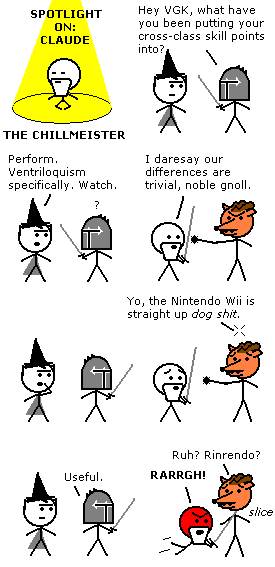
And talking of skills - those little things you put points into while playing Baldur's Gate or Icewind Dale that you never really think about again after leaving the level-up screen? They're super necessary here too. While the slightly overlapping Spot and Listen checks seem to be automatic, there's a few you'll be relying on a lot, so it's worth memorizing their place on the radial menu. You have the thief skills, which I rarely use (there hasn't been much call for them yet, though I imagine there soon will be); you have Heal which stabilizes anyone knocked unconscious and bleeding out during combat, crucial for saving their lives; you have Search which helps you uncover doors and switches without resorting to magic; you have Concentration, which is downright essential for Clerics, since they're usually in melee when you need their cure spells; you have a full assortment of dialogue skills - Intimidate, Bluff, Sense Motive and Diplomacy will all give you bonus dialogue options if you're skilled enough with them. An amazing number of quests early on require some proficiency with that particular set, causing some stymieing for first-time players who have yet to fully appreciate the necessity of the skill system.
Not to keep harping on about this game's complexity, but I found myself using these skills a lot more than I have done in similar games in the past. Whether it's because the game is generally harder and I need every advantage, or if they're just pushed to the forefront more than they have been in other D&D games as part of Troika's whole "genuine tabletop experience" package they have going on here, I can't really say for sure.
The Side-Quests

So okay, enough worshipping the ground that this game pounds me into with each encounter, time to cover something I'm not too fond of so far: The early fetch quests. It seems like a tradition, or an old charter, or something, that every CRPG - D&D or otherwise - eases the players in with a group of simple fetch quests to boost their XP to the point where they are then strong enough to actually fight something without exploding violently. It strikes me as a spectacularly bad way to start any piece of narrative fiction, even with the lax standards video games have set for themselves. You want to start on something exciting to hook people in, not find some apples for the bratty kid in the hut down the street. Getting some old guy's cigarettes for five bucks sure doesn't beat an exciting massacre of your adventuring school - Neverwinter Nights being the perfect example of getting the intro right, with its sequel being the perfect example of the opposite.
Like everything else in this game, getting any advantage as early as possible is downright essential for survival. As such, you're more or less required to get all the Hommlet fetch quests out of the way for that early XP boost. Being level 1 is no joke, especially when some party members have single figure HP totals and the first group of Moathouse bandits will be doing double digits in damage to you. But these quests are so awful. You have to introduce yourself to every carpenter, weaver, tailor, builder, lumberjack and trader in the village and solve their trivial problems. A disproportional number of which involve marrying low-level NPCs that follow you around, for some reason.
The Tough Decisions
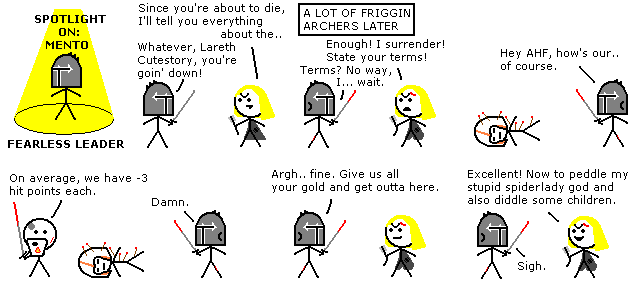
Another thing TOEE did that I'm not fond of, but in no way disparaging the game for including it this time, are the situations when you're occasionally forced to make decisions that may well come back to bite you in the ass later on or otherwise deprive you of some treasure. While there is an option to avoid a rather tough Gnoll fight (though this is actually one of the easier ones) by paying them off or using the Intimidate skill to dissuade them of their greedy notions, it's not something you're going to regret either way necessarily. It's a small amount of gold, and you can always just fight them instead for their equipment.
The biggest one so far was the one above, which comes about once you've injured the boss of the area sufficiently and he decides to throw in the towel like a big old wuss. Now while I don't expect him to get too far as a half-dead cleric of Lolth - you know, that evil spider goddess known for torture and betrayal that would definitely tolerate failure in her subordinates, especially those not of her favoured race of Dark Elves - I did not appreciate losing all the awesome gear he was no doubt sporting. Unfortunately, getting him to that point requires defeating around 10 well-armed guardsmen, including one particularly tough archer lieutenant and a couple of beefy sergeants. Should your party be in any shape to keep fighting after this ultimatum is made and you decide to continue swatting the effeminate dickweed, he then summons a bunch of giant spiders from nowhere and keeps going. You have to make that decision to let him go if you want to save and recover and move on, or lose the last 30 minutes of decisive strategic action against his small army of guards because one of his spiders gets lucky with a venomous bite. While I resent having to take it, I'm also kind of glad that option is available. Roleplaying and whatnot.
The Hirelings

The game only allows you to create and take with you five characters initially, which I thought was a little unusual at the time. But then there's no reason why a five person party shouldn't work - clearly I've been spoiled by all the Infinity Engine games and their traditional sextet crews. It turns out though that the sixth spot (and sometimes the seventh) is reserved for any number of NPCs you can talk into joining you. They get a full share of the XP and gold, which they appear to simply grab in a somewhat suspicious "behind the DM screen" automatic manner.
The little burg of Hommlet, the starting village, has some half dozen adventuring types just waiting around for some hacking and looting to come their way. Some are potential traitors working for the bad guys, some are just bad guys with no particular allegiance to anyone (but may well betray you anyway), some are starry-eyed youths with a life expectancy that will plummet once they leave the safe confines of the village and there's also a cool grifter guy with a neat hat whom I decided to hire since Claude still had a way to go with his thief skills. Of course, hiring a skilled rogue and then allowing him to surreptitiously take his "fair share" after every battle is causing me more concerns about the party bankroll than is perhaps worth it.
I've always liked games that do the half-and-half thing with player-generated but nigh soulless PCs and the additional NPC hireling with their own agendas more often than not. Despite Might and Magic IX's many failings, Forad Darre was an interesting wild card you could never be certain about but pretty much took for granted as an additional sword-arm by the time the big twist concerning his character comes around. Ditto with the additional computer-controlled guest NPCs in games like FFXII, whose continued survival - unlike the six main characters who will clearly be there come the final boss - is never assured.
Meanwhile, on another plane of reality...
Vinny & Dave Play Baldur's Gate 2: Another Backhanded Tribute To The Snidavella CRPG Dream Team

Yo, not to be a shill or anything, but I'd highly recommend you guys sign up for a subscription and watch Vinny and Dave's continuing Random PC Game feature. Even if you're a bit dry on funds, you might want to let these videos pile up and pay the paltry five bucks for a single month to get as much CRPG tomfoolery as you could ever want from Whiskey Media's two biggest PC gaming maestros. I love that series to bits.
More Temple of Elemental Evil next week. Or maybe a second part this week. It really all depends on how often I can manage to not die in a game that hates me. See you there!
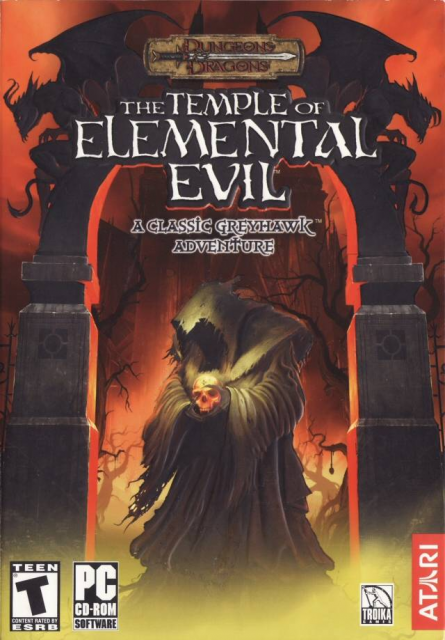
Log in to comment